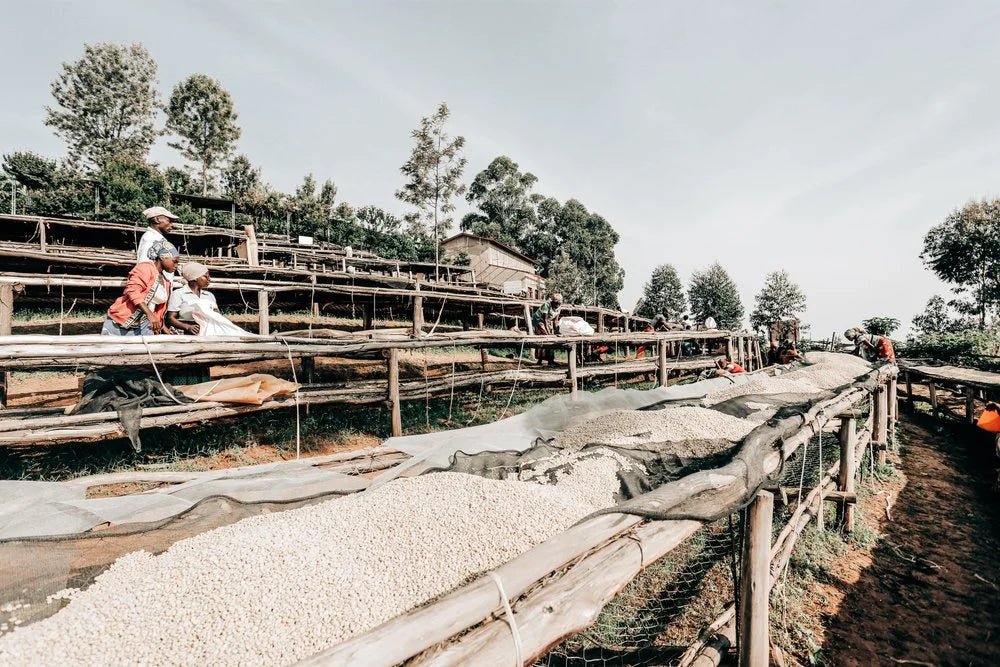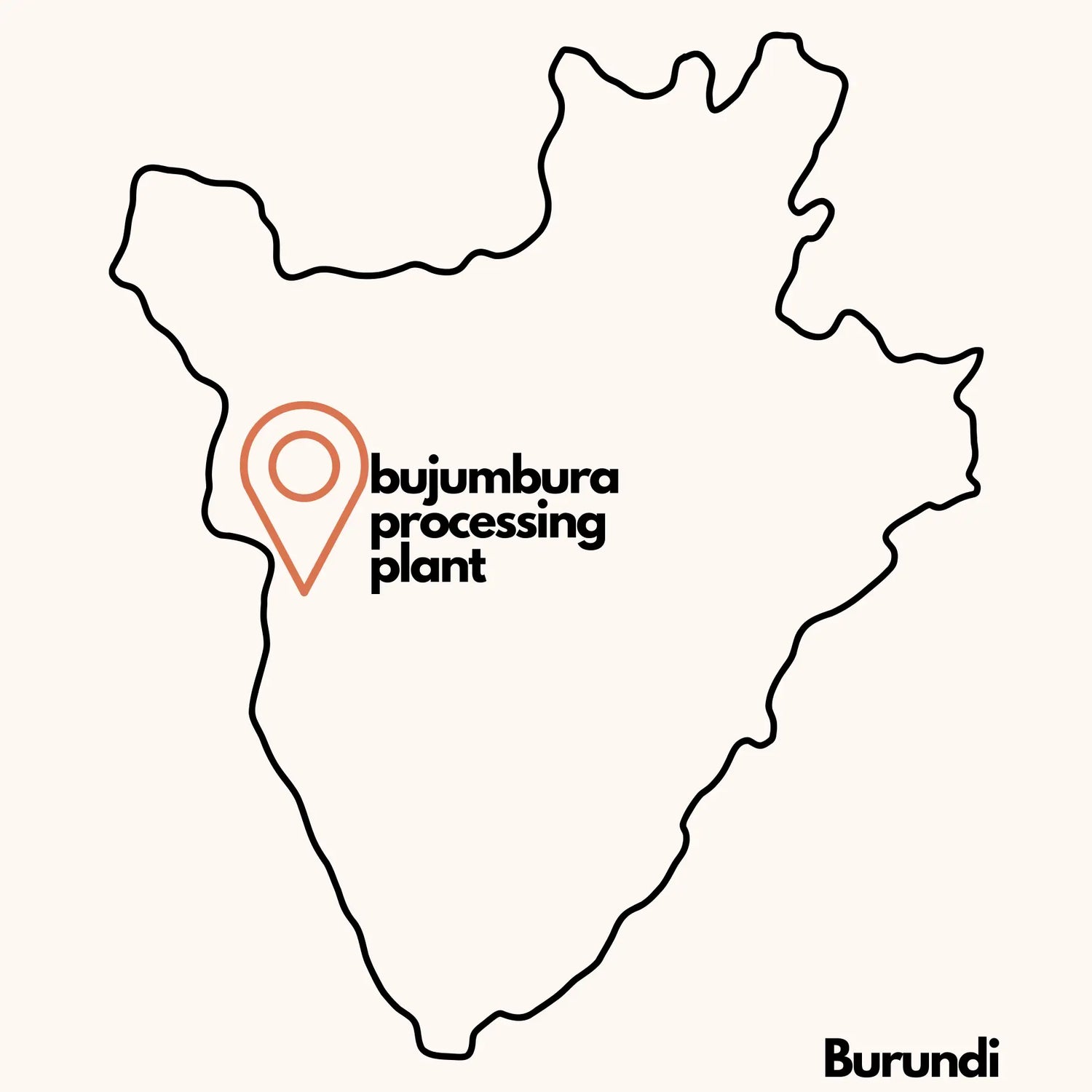Burundi | Red Bourbon | Fully Washed
Burundi | Red Bourbon | Fully Washed
Couldn't load pickup availability
Share






Coffee overview
Flavours:
apple juice, orange zest, marshmallow
Information
Country: Burundi
Region: Mutambu Valley
Altitude: 1500 - 1700 m.a.s.l
Process: Fully washed
Species: Arabica
Varietal: Bourbon
Collapsible content
more about this Burundi coffee
In 2016 Migoti Coffee Company built a coffee washing station
at Migoti Mountain, partnering with industry experts who provided technical expertise. Coffee trees are owned by the community, and Migoti purchases the coffee cherries directly from the farmers who harvest and deliver the cherries to our station. Over 300 tons of green coffee was produced and exported from Migoti Mountain in the 2017, 2018 and 2019 coffee seasons. These harvests have received excellent cupping scores, frequently placing it as some of the best speciality coffee coming from Burundi.
The washing station is operated by a local team of ten
permanent staff and over 250 temporary workers who are employed during the coffee season from March to June.
The station manager, Zephyrin Banzubaze, is responsible for
managing all of the staff to train coffee farmers, receive and select
coffee cherries, process the coffee, oversee the coffee drying process, store and mill the dry parchment coffee and prepare the final green coffee for export. The majority of the temporary staff are women, who work mainly on the raised drying tables, regularly turning the coffee as it dries and removing defective beans that compromise the coffee quality. Migoti also assists farmers through ongoing education to prune and properly care for coffee trees, intercrop, plant shade trees, utilize green fertilizers, stabilize soils and natural pest control. The expectation is that by following best farming practices the farmers can increase the yields from their coffee trees by five- to ten-fold.
This washing station operates in a region referred to as Migoti Mountain, in Mutambu Commune of Bujumbura Province, 30 km from the centre of Bujumbura. Coffee farming and production began in Burundi in the early 1900s under Belgian colonial rule, where farmers were
forced to grow coffee, the produce was bought and processed by the state and coffee was exported primarily to Europe. The sector was privatized in the 1960s, followed by state control from 1976 to 1991, and then a new wave of privatization began in 1991.
After the civil war in the 1990s, coffee has slowly emerged
as a means to rebuild the agrarian sector and to increase foreign exchange, with an increase in investment and a somewhat healthy balance
of both privately and state-run coffee companies. However, following the political crisis of 2015 and the subsequent economic crash, the coffee sector has struggled to meet the expectations and potential to stimulate the economic growth of Burundi.
Burundi is among the smallest coffee-producing countries in
East Africa, with a population of 10.5 million that is endowed with
ideal conditions for coffee production: elevations of 1500 - 2000 m, Arabica Bourbon coffee trees, abundant rainfall, and approximately 800,000 families who cultivate an average of 150-200 coffee trees per
farm. Arabica coffee now represents virtually 100% of Burundi’s national production and the bourbon variety grown at high elevations in Burundi is characteristically “sweet with bright acidity, big body, floral,
citrus and spiced with wild notes.” Over the past 25 years, coffee production in Burundi has averaged 26,700 tons per year.
This coffee is fully washed processed
Fully washed coffee is a coffee processing method that involves removing the outer skin (cherry) and pulp from the coffee beans immediately after harvest. The beans are then thoroughly cleaned and fermented to remove any remaining mucilage. This meticulous washing process results in a clean, bright, and distinctly flavoured coffee. Fully washed coffee often boasts a higher level of acidity and clarity, making it a favourite among coffee enthusiasts. Learn more about the fascinating world of fully washed coffee and the unique flavours it can offer.
Savour the exceptional flavours of our Burundi coffee, a true testament to dedicated community efforts. Grown by numerous local farmers and processed at Migoti Mountain washing station, Burundi, every coffee cherry undergoes meticulous selection and sorting to ensure only the finest beans reach your cup. The result? A coffee that's remarkably rich, with the bright essence of apple juice, the sweetness of marshmallow, and a zesty hint of orange. Explore the unique character of this community-crafted Burundi coffee.

Get ready to enjoy some amazing benefits with a Burundi subscription and brew next level coffee from the comfort of your home. You'll get 15% discount off the retail price and hassle-free, discounted delivery right to your doorstep.
Burundi Coffee FAQ's
Burundis unique coffee compared to coffee from other regions
Burundi coffee is known for its distinctive flavor profile, characterised by bright acidity, floral notes, and a balanced sweetness. Its unique terroir, which includes high altitudes and volcanic soil, contributes to these characteristics.
Burundi coffee processing
Burundi coffee is often processed using the washed method, involving
fermentation and thorough washing of the coffee beans. This process is
vital because it enhances the clarity of flavours, cleanliness, and acidity in the final cup.
Burundian coffee and the part it plays in Burundis economy and societ
Coffee is a significant contributor to Burundi's economy, providing
income and employment to a substantial portion of the population. Additionally, it plays a role in the cultural and social fabric of the country.
Burundian coffee farmers passion for what they do
Burundian coffee farmers are deeply passionate about their work. They often share their enthusiasm for growing coffee with visitors, offering guided tours of their farms, and discussing their sustainable farming practices, creating a warm and welcoming atmosphere that showcases their dedication to their craft.
Burundis coffee festivals
Burundi hosts exciting coffee festivals, where locals and visitors come together to celebrate their love for coffee. These events are filled with music, dance, and joyful interactions, creating a lively atmosphere that showcases the country's vibrant culture.




